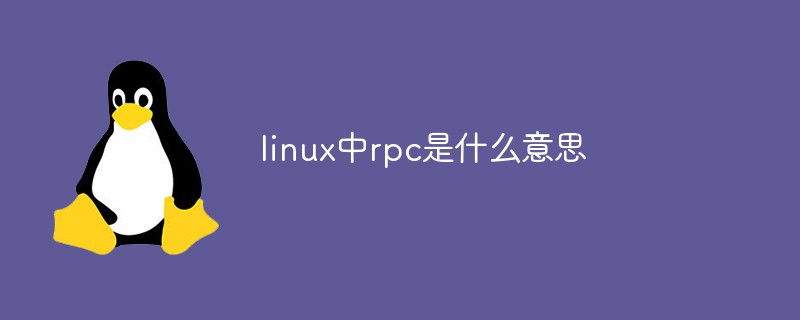In Linux, nobody is an anonymous user, a non-privileged user who can only access public content on the server. The "purpose" of using the nobody username is to allow anyone to log in to the system, but its UID and GID do not provide any privileges, that is, the uid and gid can only access files that everyone can read and write. Because the default login shell is "/sbin/nologin", user nobody cannot directly log in to the system, which means it is difficult for hackers to connect to your server through vulnerabilities to cause damage.

#The operating environment of this tutorial: linux7.3 system, Dell G3 computer.
The Windows system will automatically create some user accounts after installation. In the Linux system, there are also some user accounts that are available after the
system is installed, just like the built-in accounts in the Windows system.
They are used to complete specific tasks, such as nobody and ftp, etc. When we access the web program of LinuxSir.Org, the official website server allows customers to log in as 'nobody' (equivalent to the Windows system Anonymous account);
When we access ftp anonymously, we will use user ftp or nobody.
What is the nobody user under Unix/Linux system?
nobody is an ordinary user, a non-privileged user. The 'purpose' of using the nobody username is so that anyone can log into the system, but its UID and GID do not provide any privileges, that is, the uid and gid can only access files that everyone can read and write.
In many systems, a nobody is created by default by default, and try to 'limit its permissions to the minimum'. When the server provides external services, the client may be allowed to log in as nobody.
nobody is an ordinary account. Because the default login shell is '/sbin/nologin', this user cannot log in to the system directly, which means it is difficult for hackers to connect to your server through loopholes to cause damage. In addition, the permissions of this user are also configured very low. Therefore, it has relatively high security. Everything is only given to the lowest permissions. This is the meaning of nobody's existence.
What does it mean that the user shell is /sbin/nologin in Unix/Linux system?
If a user's default shell is set to /sbin/nologin, the user is prohibited from logging into the system;
The function of this nologin is to restrict certain users from ssh. Log in to the shell.
For example, you can set the user default shell of applications such as nginx mysql php-fpm to /sbin/nologin in daily life
Mainly to improve system security
The shell of the system account Using /sbin/nologin, you cannot log in to the system at this time, even if you give the password.
The so-called "unable to log in" only means that the user cannot use bash or other shells to log in to the system. It does not mean that this account cannot use system resources. For example, in each system account, the print job is managed by the lp account, and the www server is managed by the apache account. They can both perform system program work, but they cannot log in to the host.
Sometimes some services, such as email services, are mostly used to receive emails from the host and do not require login. If an account tries to connect to my host to get a shell, we can reject it.
Sometimes you can use the /etc/nologin file to temporarily prohibit other users from logging in. The specific method is to create a file named nologin in the /etc/ directory.
For example:
#touch /etc/nologin
This will prohibit subsequent users from logging into the system.
When a user is prohibited from logging in, the contents of the /etc/nologin file will be displayed to the user and will flash by.
For example, add the following content to the /etc/nologin file:
#vi /etc/nologin disable login by admin temperarily!
When the user attempts to log in, "disable login by admin temperarily!" will be displayed to the user. When the system maintenance is completed In the future, if you delete the /etc/nologin file, other users can resume login again. This is only limited to users who can log in to the shell.
There is no such thing for those users whose login shell is /sbin/nologin. Impact, because they cannot log in to the shell themselves.
In addition, if I want to let a user with /sbin/nologin know that they cannot log in to the host, I can create a new file /etc/nologin.txt and write the reason why they cannot log in inside the file. , when the user logs in, the contents of this file will appear on the screen.
For example:
#vi /etc/nologin.txt This account is system account or mail account. #su - mail
will prompt "This account is system account or mail account."
Supplement:
/etc The functions of the two files /nologin and /etc/nologin.txt are not the same.
When the /etc/nologin file exists, any general identity account will only obtain the contents of /etc/nologin when trying to log in, and will not be able to log in to the host directly.
When /etc/nologin is created and the content is set to "This Linux server is maintained....", anyone who tries to log in will see these prompts and will not be able to log in to the system.
Until the /etc/nologin file is deleted, ordinary users can log in normally.
Summarize:
nobody is an anonymous user under the linux/unix system and can only access public content on the server
/sbin/nologin is under the linux/unix system A shell setting item that does not allow users whose login shell is /sbin/nologin to log in to the system
/etc/nologin.txt is only for users whose login shell is /sbin/nologin
/etc/nologin can be understood as targeting all ordinary users
Related recommendations: "Linux Video Tutorial"
The above is the detailed content of What user is linux nobody?. For more information, please follow other related articles on the PHP Chinese website!
 什么是linux设备节点Apr 18, 2022 pm 08:10 PM
什么是linux设备节点Apr 18, 2022 pm 08:10 PMlinux设备节点是应用程序和设备驱动程序沟通的一个桥梁;设备节点被创建在“/dev”,是连接内核与用户层的枢纽,相当于硬盘的inode一样的东西,记录了硬件设备的位置和信息。设备节点使用户可以与内核进行硬件的沟通,读写设备以及其他的操作。
 Linux中open和fopen的区别有哪些Apr 29, 2022 pm 06:57 PM
Linux中open和fopen的区别有哪些Apr 29, 2022 pm 06:57 PM区别:1、open是UNIX系统调用函数,而fopen是ANSIC标准中的C语言库函数;2、open的移植性没fopen好;3、fopen只能操纵普通正规文件,而open可以操作普通文件、网络套接字等;4、open无缓冲,fopen有缓冲。
 linux中什么叫端口映射May 09, 2022 pm 01:49 PM
linux中什么叫端口映射May 09, 2022 pm 01:49 PM端口映射又称端口转发,是指将外部主机的IP地址的端口映射到Intranet中的一台计算机,当用户访问外网IP的这个端口时,服务器自动将请求映射到对应局域网内部的机器上;可以通过使用动态或固定的公共网络IP路由ADSL宽带路由器来实现。
 linux中eof是什么May 07, 2022 pm 04:26 PM
linux中eof是什么May 07, 2022 pm 04:26 PM在linux中,eof是自定义终止符,是“END Of File”的缩写;因为是自定义的终止符,所以eof就不是固定的,可以随意的设置别名,linux中按“ctrl+d”就代表eof,eof一般会配合cat命令用于多行文本输出,指文件末尾。
 linux怎么判断pcre是否安装May 09, 2022 pm 04:14 PM
linux怎么判断pcre是否安装May 09, 2022 pm 04:14 PM在linux中,可以利用“rpm -qa pcre”命令判断pcre是否安装;rpm命令专门用于管理各项套件,使用该命令后,若结果中出现pcre的版本信息,则表示pcre已经安装,若没有出现版本信息,则表示没有安装pcre。
 什么是linux交叉编译Apr 29, 2022 pm 06:47 PM
什么是linux交叉编译Apr 29, 2022 pm 06:47 PM在linux中,交叉编译是指在一个平台上生成另一个平台上的可执行代码,即编译源代码的平台和执行源代码编译后程序的平台是两个不同的平台。使用交叉编译的原因:1、目标系统没有能力在其上进行本地编译;2、有能力进行源代码编译的平台与目标平台不同。
 linux怎么查询mac地址Apr 24, 2022 pm 08:01 PM
linux怎么查询mac地址Apr 24, 2022 pm 08:01 PMlinux查询mac地址的方法:1、打开系统,在桌面中点击鼠标右键,选择“打开终端”;2、在终端中,执行“ifconfig”命令,查看输出结果,在输出信息第四行中紧跟“ether”单词后的字符串就是mac地址。
 linux中rpc是什么意思May 07, 2022 pm 04:48 PM
linux中rpc是什么意思May 07, 2022 pm 04:48 PM在linux中,rpc是远程过程调用的意思,是Reomote Procedure Call的缩写,特指一种隐藏了过程调用时实际通信细节的IPC方法;linux中通过RPC可以充分利用非共享内存的多处理器环境,提高系统资源的利用率。


Hot AI Tools

Undresser.AI Undress
AI-powered app for creating realistic nude photos

AI Clothes Remover
Online AI tool for removing clothes from photos.

Undress AI Tool
Undress images for free

Clothoff.io
AI clothes remover

AI Hentai Generator
Generate AI Hentai for free.

Hot Article

Hot Tools

SublimeText3 Chinese version
Chinese version, very easy to use

Dreamweaver Mac version
Visual web development tools

WebStorm Mac version
Useful JavaScript development tools

Notepad++7.3.1
Easy-to-use and free code editor

SecLists
SecLists is the ultimate security tester's companion. It is a collection of various types of lists that are frequently used during security assessments, all in one place. SecLists helps make security testing more efficient and productive by conveniently providing all the lists a security tester might need. List types include usernames, passwords, URLs, fuzzing payloads, sensitive data patterns, web shells, and more. The tester can simply pull this repository onto a new test machine and he will have access to every type of list he needs.






